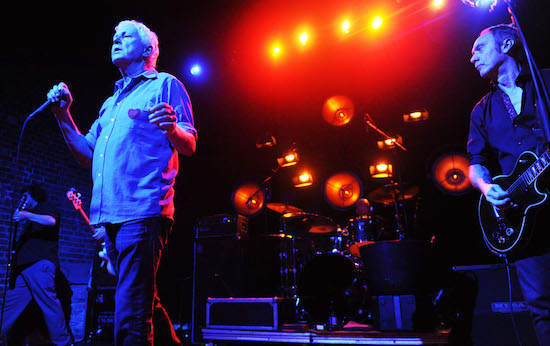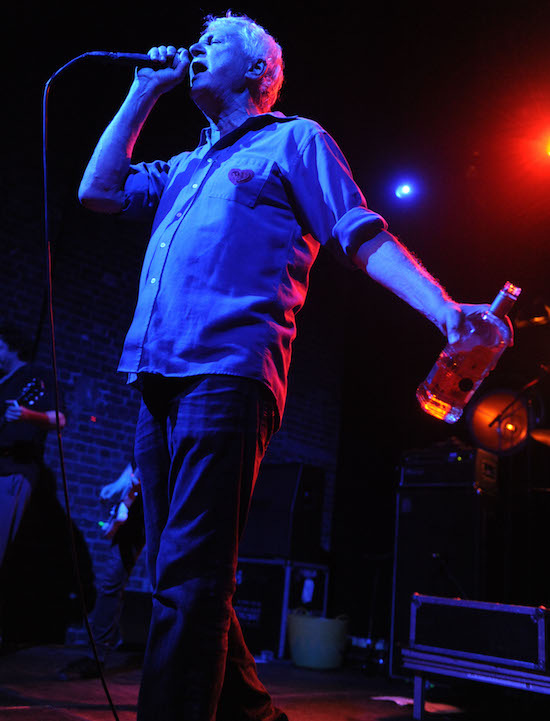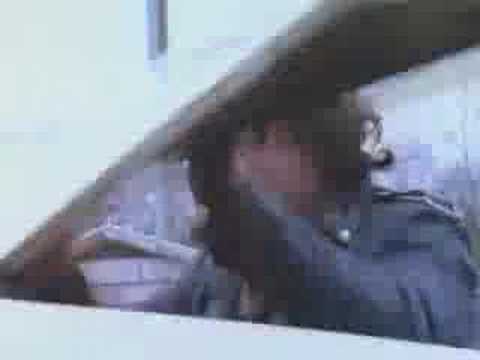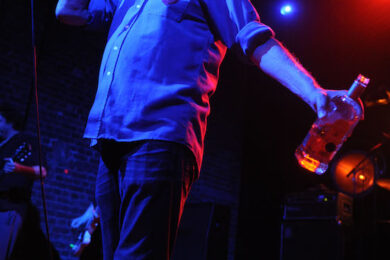I’d been using Spotify to listen to old albums I hadn’t listened to for years as I drove back to London from the Sea Change festival in the gorgeous south-western sunset: the first one by Pale Saints, and Death Penalty by Witchfinder General (both brilliant. Do dig them out). Somewhere near Thorpe Park, I switched to the Release Radar playlist, which usually assumes I want to listen to bearded blokes with acoustic guitars in whom I have little or no interest. Skip. Skip. Skip. Skip. Skip.
Then, as I came off the A4 at Hammersmith, one of “those moments” happened. A song came on by a band I had never heard of. A little bit shoegazey, a little bit psychey, a big roar of guitars, a bassline with a hiccup in its descent: recognisably endebted to that strain of American psych-rock descended from Spacemen 3 that traces its lineage through Brian Jonestown Massacre, Dandy Warhols, The Warlocks, The Black Angels et al. It wasn’t desperately original, but it was brilliant; it didn’t do terribly much, just circling around the same spot, but it did it all fantastically, like Jan Molby in his Liverpool pomp. For the first time, I was pleased by a traffic snarl-up at Hammersmith Broadway: it meant I could listen to ‘Bells’ by The Vacant Lots three times in a row without worrying about driving into the side of a bus.
That’s the power of the song. The individual song: just a few minutes in which people can stake their claim to immortality. Only music – and, I think, really only pop music in its many and varied forms – can do that. Only music can make such an instant and immediate impression. Maybe some people can look at one painting for just three and a half minutes and gain the same thrill I did from ‘Bells’, but I suspect you need to pay rather more attention than that to get the most from great art. A film or a play requires you to spend a couple of hours, and with plays, at least, you can’t revisit them whenever you want. A book can transform you, but you’ll be spending hours and hours with it.
But in three minutes, a song can twist you and shout at your emotions. It can elevate you. It can fulfil a need you didn’t know you had. And then you can go back to the beginning and play it again and again and again. And you only need one of them, one great song, to achieve immortality, like the bands on all those Nuggets and Pebbles and Rubble compilations. You can have recorded scores of songs, but one single track – not for nothing did the seven-inch single, which turned 70 this year, become the vehicle of pop music – can alter the course of history. Just ask Johnny Burnette, whose version of ‘Train Kept A-Rollin’’ would be copied or adapted by The Yardbirds, Led Zeppelin, Aerosmith, Motörhead and scores more. One song, just one song, a building block of hard rock.
Some time in the mid-90s, I had another of “those moments”. I’d been on holiday in New York and picked up a three-CD Matador compilation. On it was ‘Motor Away’ by Guided By Voices, to whom I’d never bothered listening before. ‘Motor Away’ was such a great song I didn’t want to run the risk of ruining it by listening to anything else by them. In retrospect, I realise it also introduced me to one of my very favourite lyrical themes in music: the notion that freedom is a lie (it’s a big one in my favourite Bruce Springsteen songs), and that you cannot escape, even when the future lies before you like virgin snow. “When you motor away down the icy streets / You can’t lie to yourself that it’s the chance of a lifetime,” reads to me as the purest expression of the notion that the power of dreams lies in the fact that they tend not to come true. I loved ‘Motor Away’ so much that during the 1998 World Cup, when I was invited to be the World Cup analyst on the GLR breakfast show with Gideon Coe and Ruth Awbery, I demanded they play ‘Motor Away’ as my payment. They did.
When I hear a perfect song, I’m often very happy not to hear anything else by whoever made it, whereas something imperfect is more likely to lure me in to see if its maker has managed to surpass it. I’m more likely, even, to pick up an album by someone I’ve only heard about, but never heard. ‘Call Me Maybe’ was so flawless that I’ve never felt the need to listen to anything else by Carly Rae Jepsen; I do have more than one Only Ones record, but I only ever listen to the one song (you know which one). In the end, I did end up going deeper in to GBV. Quite a bit deeper. I ended up buying around 30 albums, but ‘Motor Away’ is still the song. The one song.
By chance, Guided by Voices and The Vacant Lots ended up playing on consecutive nights in London last week. Of course, I went to both. I wanted to have “those moments” hearing that particular song. And to see if I was alone in believing those two songs to be somehow special, apart from the rest of the two bands’ catalogues.
They were different shows, of course. GBV’s Wednesday night gig at the Village Underground was their first London show in 16 years, and the queue to get in snaked down Great Eastern Street. It was rammed, ecstatic, celebratory. At the Shacklewell Arms, The Vacant Lots faced two or three dozen people, the invisible exclusion ring at the front of the stage firmly in place. GBV played for two and a half hours, 53 songs (a set that cleaved to the tuneful end of their catalogue thankfully; on their 2004 farewell tour I flew out, as a fan, to see them in New York, got ridden with food poisoning, dosed myself up with Immodium to get to the gig, which began at 11.30pm, and had to contend with Robert Pollard announcing it would be a set of obscure – tuneless – favourites. I think it lasted for four hours. I had lost the will to live some time before the end). The Vacant Lots played for maybe 50 minutes, and there was no air of hysteria about the place.
But still, in both shows, that one song still stood out. At GBV, ‘Motor Away’ came 11 songs in, and you could feel the room swell. For the first time, everyone in the room sang along, not just the people at the front. The sound engineer, his desk just in front of us, punched the air, played air guitar, and bellowed out the words. Even on an evening when everyone present was treating each new song like a seven-year-old opening a particularly spectacular assortment of Christmas presents.

I’d avoided listening to anything else by The Vacant Lots before their show; I didn’t want to risk finding out that it was a fluke, that the rest of their songs were turgid. I wanted to be surprised. I wouldn’t say, exactly, that I was surprised: they sounded how more or less how I expected them to sound – analogue electronics mixed with droning guitars. And in places they were really excellent, driving and intense and reconfiguring familiar ingredients with enough imagination to make them taste fresh – ‘Mad Mary Jones’ was fantastic. But ‘Bells’, still, was something else. And everyone there knew it. Though you couldn’t help but feel sorry for The Vacant Lots when, as the song finished, one man shouted “Play it again!” And then, after the next song, when he called out for it again.
But, really, to have written one song that is fantastic enough that someone at a half-full gig is willing to make a fool of themselves by shouting out for it over and over again – that’s an achievement that shouldn’t be diminished. When you have written and recorded that one song, you have managed something spectacular: you have left a mark on history, however faint. And that mark will be uncovered again and again and again over generations. There will always be a 17-year-old somewhere, tracing lines back from something they have uncovered, and they will find that one song and obsess over it. And it, it turn, will lead them to somewhere new, the same way ‘Action Woman’ and ‘Psychotic Reaction’ and ‘I’m Five Years Ahead of My Time’ and ‘Incendiary Device’ and ‘King Of The Bop’ did for me at the same age. I would love ‘Bells’ to appear before some kid 30 years younger than me and send them wild with excitement
And, while I sometimes despair of Spotify’s algorithms always leading listeners to the familiar, I rejoice that it can give me moments like I had stuck in traffic Hammersmith Broadway, when that one song I’d never heard before played and for a few minutes the rest of the world disappeared.





